Serbia
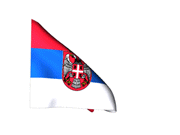
Serbia, is a sovereign state situated at the
crossroads between Central and Southeast Europe, covering the southern part of the Pannonian
Plain and the central Balkans. Serbia
is landlocked and borders Hungary
to the north; Romania and Bulgaria to the east; Macedonia
to the south; and Croatia, Bosnia, and Montenegro
to the west; it also claims a border with Albania
through the disputed territory
of Kosovo. The capital of
Serbia, Belgrade, is
one of the largest cities in Southeast Europe.
As of a 2011 census, Serbia
(excluding Kosovo) had a total population of 7.2 million.
Tourism
Serbia is not a mass-tourism destination but
nevertheless has diverse range of touristic products . Tourism is mainly focused on the
mountains and spas of the country, which are mostly visited by domestic
tourists, as well as Belgrade
which is preferred choice of foreign tourists. The most famous mountain resorts
are Kopaonik, Stara Planina, and Zlatibor. There are also many spas in Serbia, the
biggest of which is Vrnjačka Banja,
Soko Banja, and Banja Koviljača.
City-break and conference tourism is developed in Belgrade
Sport in Serbia
Sports play an important role in
Serbian society, and the country has a strong sporting history. The most
popular sports in Serbia
are football, basketball, tennis, volleyball, water polo and handball. Football
is the most popular sport in Serbia,
and the Football Association of Serbia with 146,845 registered players, is the
largest sporting association in the country. Serbia
is one of the traditional powerhouses of world basketball, as Serbia men's
national basketball team have won two World Championships (in 1998 and 2002).
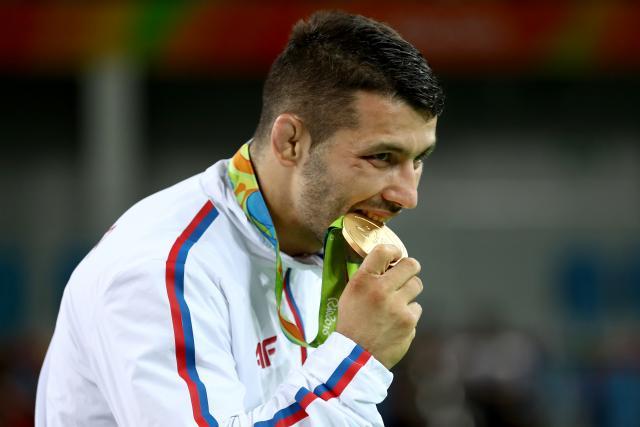
Serbias Olympic Gold Medalist 2016 in Rio de Janeiro, Davor Stefanec.
Wrestling in Serbia
Wrestling is called "Rvanje" in Serbia. The National Wrestling Federation has its headquarters in the capital, Belgrade, and is
called "Rvacki Savez Srbije".
As president acts, Mr. Nenad Lalović, who is
also president of the International
Wrestling Association UWW. Wrestling is traditionally anchored
in Serbia and
there are 85 Wrestling clubs across the country and 18 in the Capitol City of Beograd.
The stronghold of Serbian Wrestling is
located in the Voivodina. In Serbia, the Greco
/ Roman style is
very popular but in freestyle
and female wrestling,
the country has achieved not much
international success.
International
Situation
Within the
Yugoslav national team, the Serbian Wrestlers played mostly a good role
internationally.
After the political changes and the separation of the Yugoslavia at
the beginning of the nineties, this level could not be maintained. The Serbian
Wrestling Association has too few members to compete internationally with the
great wrestling nations. For the small Serbian Wrestling Federation, it is
increasingly difficult to qualify athletes for the Olympic Games. 2008 in
Bejing have participated two serbian Wrestlers Christian Fris and Davor Stefanec. 2012 in
London Alexandar Maksimowic was the one and only serbian wrestler at the Games.
For its
possibilities, serbia
runs a good youth development and has dedicated teams. In greco/ roman style Serbia
could produce exceptional athletes . At
the World Championships 2014 in Tashkent (Uzbekistan)
succeeded Davor Stefanec in the 66Kg category a surprising the world title.
2015 was Viktor Nemes surprisingly European champion. 2013 the small Serbian
Wrestling Federation had hosted the Cadet World Championships in the university
town of Zrenjanin.
The serbian wrestling federations were happy about silver (Boban Zivanovic) and
Bronze ((Miklos Horti). Serbia
won a sensational Gold Medal at the Olympic Games in Rio de Janeiro. Davor Stefanec was the hero
of the nation and won the first medal after 11 days of disappointing results
and was credited by other Serbian athletes for raising their spirits.
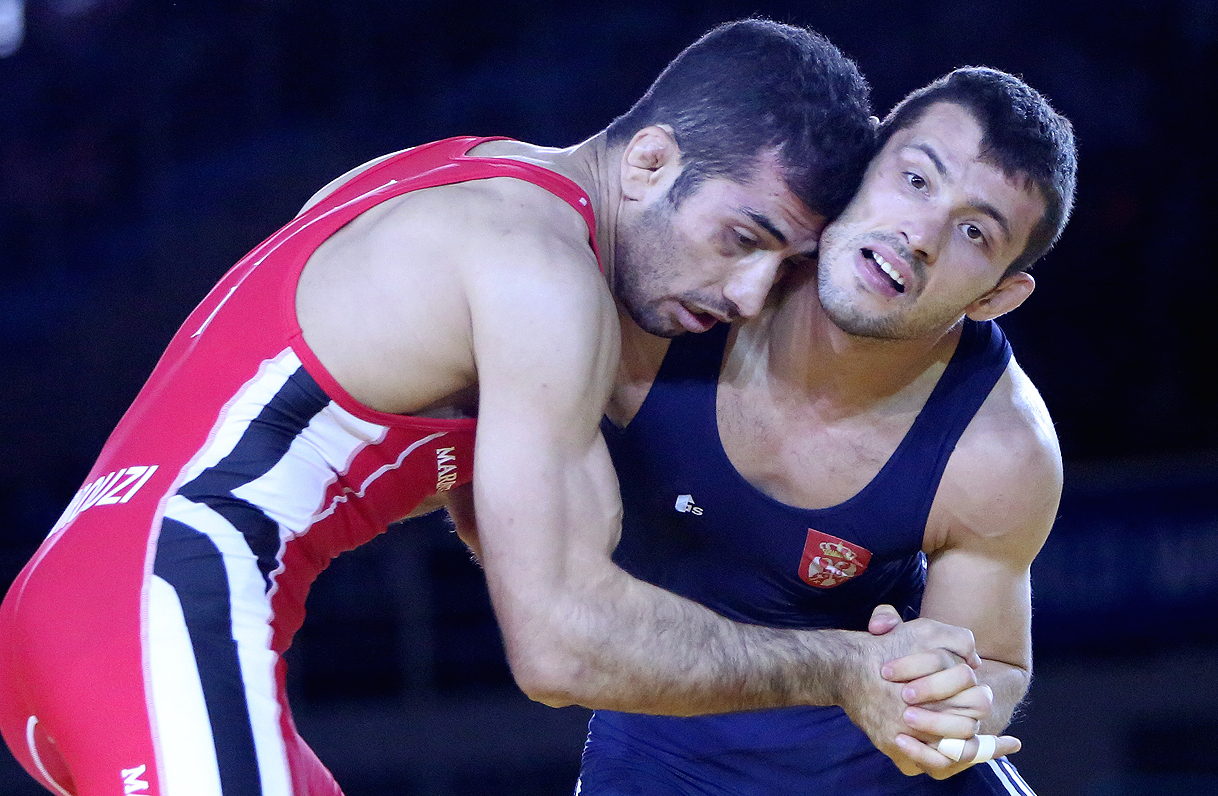 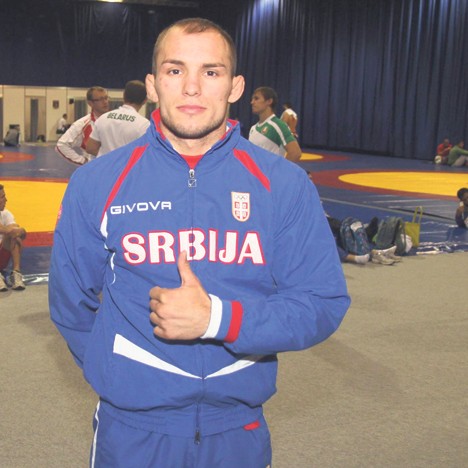 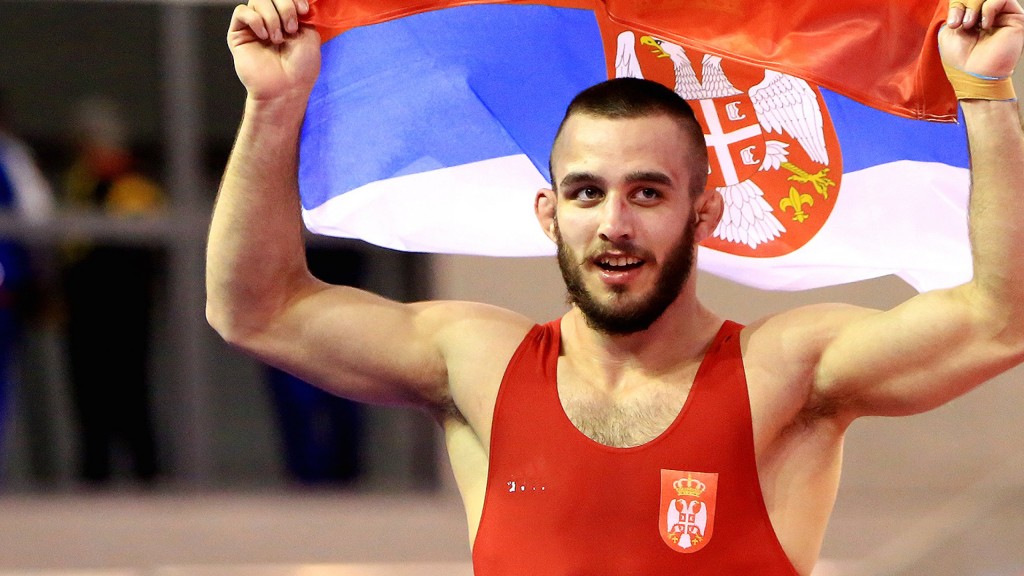
Serbias current international wrestlers Davor
Stefanec (left, blue),
Alexandar Maksimovic
and Victor Nemes.
The biggest
international successes of
serbian wrestlers:
For Yugoslavia:
Momir Petković (from Subotica) Olympic gold medalist 1976 in Montreal 82Kg greco.
He also claimed three World
silver medals (1978, 1979, 1981) and a World bronze medal (1977) during his
career. Petkovic placed fourth in the 1984 Olympic Games in Los Angeles, Calif.
Momir was revered for his majestic mustache which gave him great power. His
competitive international Greco-Roman career spanned from 1970–1984. Petković emigrated in 1986 with his family from Yugoslavia
to the United
States. He was Coach of New York Athletic Club and
then he worked as an assistant coach and later as head coach for the US national
greco/roman team. He was the
Coach of Olympic Gold medalist Rulon Gardner in 2000.
Sreten
Damjanović European Champ 1969 und Worldchampion 1971
68Kg greco. He is Coach of the Premium Club „Proleter Zrenjanin“.
Branislav „Branko“ Martinović . Olympic Silver Medal 1960 and 1964 greco.
Refik
Memišević (Subotica) Worldchampion 1981 and Olympic Silver 1984 in Los Angeles.
Milan Nenadić Olympic Bronce 1972 in Munich 82Kg greco.
Darko
Nišavić European Bronce 1972 90Kg greco.
Branislav
Simić (from Zrenjanin) World Silver 1963 and 1964
Olympic Champion in Tokyo, Olympic Bronce 1968 Mexico City.
Borivoje
Vukov (from Novi Sad) World Champion
1963 52Kg, greco.
For Serbia:
Davor Stefanec (Club Proleter Zrenjanin), World Champion
2014, 66Kg and 3. European Champ 2008 60
Kg greco. Olympic gold medalist 2016 in Rio
de Janeiro 66Kg greco.
Alexandar Maksimovic (Club Partizan Belgrad) double
Junior European Championships (2007 and 2008), 2. Junior World Champr 2008 and
double Bronce European Championships 2012 and 2013.
Christian Fris (Club RK Omladinac Zrenjanin) Junior European
Champ 2004, 3.European Champ 2007 and 3. World Champ 2007 55Kg greco.
Viktor Nemes (Club Proleter Zrenjanin) 1. European Champ
2015 75Kg greco.
National Situation
The stronghold of the Serbian Wrestling is located in the Voyvodina.
The best clubs
of Serbia
are: Proleter Zrenjanin,
Partizan Belgrade, RK Novi Sad and RK Spartak Subotika. In Serbia,
greco/roman is much more popular than freestyle or female wrestling.
Nationalcoach in Serbia
is Prov. Bojan
Mijatov.
"Narodno Rvanje" is
the traditional wrestling style in Serbia and Montenegro.
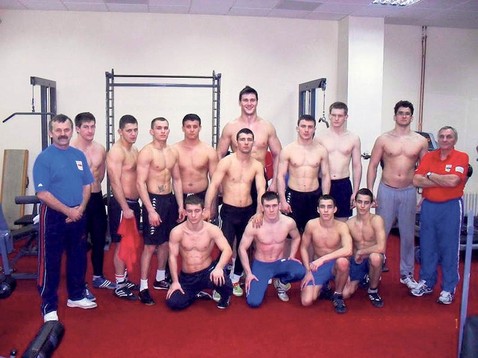
A Serbian National Selection in wrestling.
Team
Competitions (League)
Wrestling in Serbis as a
team sport as well. In Serbia there three Leagues in
greco/roman and one League in Freestyle.
Two teams compete against each
other. Each team is usually eight starters on
and the team score one Point for one individual win.
I. League 2016 gr/rom
1. Proleter Zrenjanin
2. Spartak Subotica
3. Partizan Beograd
4. Potisje Kanjza
5. Radnikcki Kragujevac
6. RK Novi Sad
7. Radnikcki Sombor
8. RK Senta
9. Radnikcki
Beograd
II.
League
2016 gr/rom
1.
Crvena Zvezda Beograd
2.
Soko Sombor
3.
Vitez Sabac
4.
Lj. Gedza Mladenovac
5.
Tent Obrenovac
6.
Fruskogorac Sremska Kamenica
7.
Mladost Valjevo
8.
Omladinac Botos
I. League 2016 Freestyle
1. RK
Kragujevac
2. Freestyle
Beograd
3. Zelesnicar
Beograd
4. Dorcol
Beograd
5. Crvena
Zvezda Beograd
6. Mladost
Valjevo
Sports officials from Serbia:
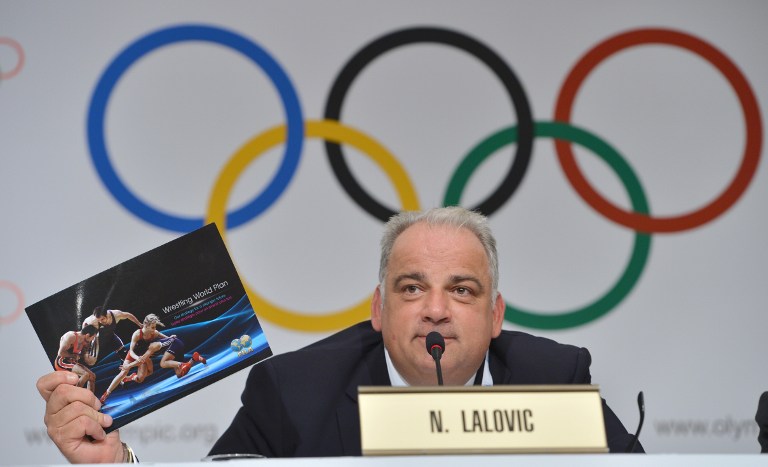
The serbian UWW President Nenad Lalovic saved Olympic Wrestling.
Milan Ercegan, was the former President of the former
supervising Olympic wrestling body FILA from 1972 to 2002.
Nenad Lalovic, a businessman from Belgrade, Serbia,
is the current president of United World Wrestling, formerly known as FILA, the
international federation of wrestling.

Federation
President: Mr. Nenad Lalović
Chairman: Mr. Zeljko Traikovic
adress: 11000 BEOGRAD, Knez Mihajlova 7/II
phone: ++381.11.26.28.787
phone: ++381.11.26.20.386
fax: ++381.11.26.28.787
E-mail: srb@fila-wrestling.com
Homepage:
http://www.wrestling-serbia.org.rs/
Wrestling Clubs in Serbia:
http://www.wrestling-serbia.org.rs/klubovi/klubovilist.php
07 / 2015
|







